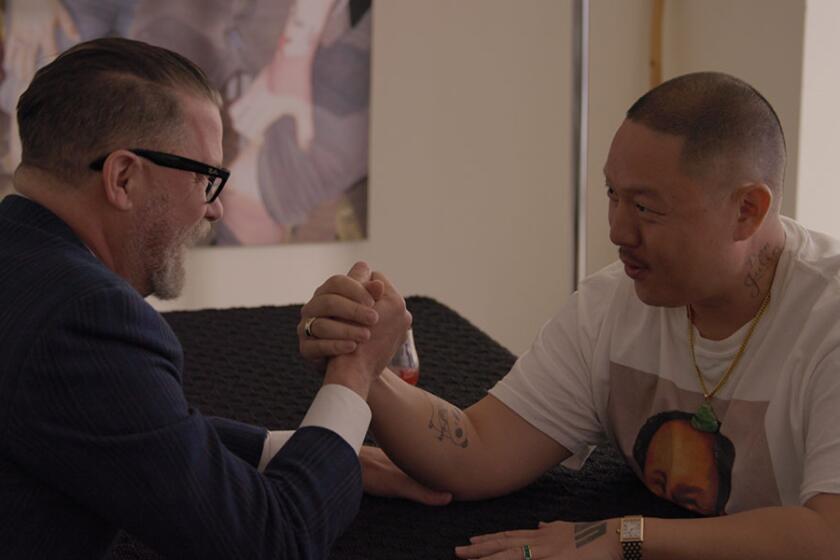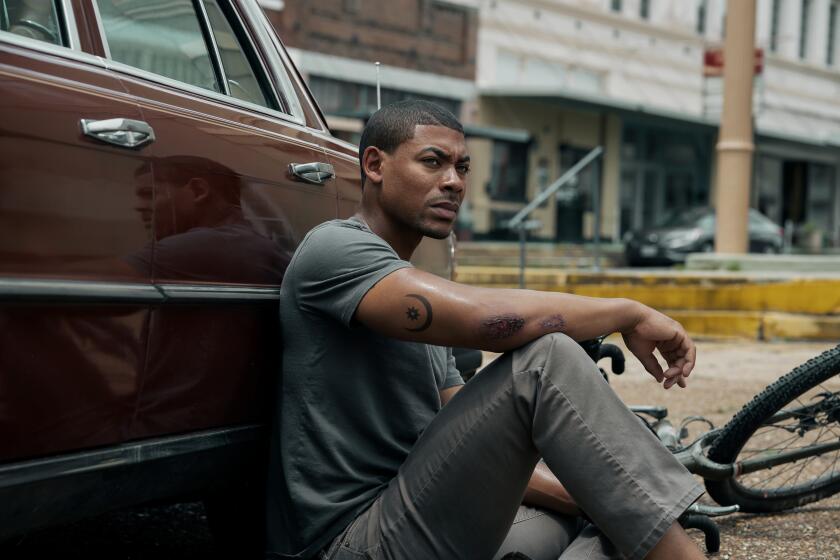Ending the Silence Over ‘Nuremberg’
It is a landmark film that has been seen by virtually no one in the United States.
“Nuremberg,” an unsparing, 78-minute black-and-white film, was assembled in 1946 by the esteemed documentarian Pare Lorentz, who intercut footage of the Nuremberg war crimes trials with concentration camp atrocities filmed by the Nazis themselves and captured immediately after World War II.
Working for the U.S. War Department’s film unit, Lorentz reviewed a million feet of Nazi footage “so gruesome that he was sick to his stomach every night,” recalled his widow, Elizabeth, in a telephone interview from her Long Island, N.Y., home.
Fearing a reigniting of anti-German sentiment, “Nuremberg” was kept from the American public at the initiative of John Foster Dulles, who later became secretary of state, and German Chancellor Konrad Adenauer. The ban was briefly lifted in the early 1960s when Jacqueline Kennedy intervened on behalf of a Boston public TV station seeking to show it.
Tonight, the long-suppressed documentary gets its first public showing in decades, presented by the International Documentary Assn. at the Museum of Tolerance, kicking off a national tour, to be followed by worldwide distribution and video release.
Those familiar with “Nuremberg” say that while it played to sold-out houses in postwar occupied Germany, it was kept from Americans for political reasons.
“The decision to show it in the U.S. had to come from higher authority. Dulles was close to Adenauer. Adenauer urged Dulles not to show the film in the U.S. for fear of arousing anti-German sentiment. So it was buried,” said Eric Barnouw, author of “Documentary: A History of the Non-Fiction Film” and a professor emeritus at Columbia University. He will moderate tonight’s screening and panel discussion.
The Nuremberg war crimes trials were conducted by an international tribunal beginning in 1946 to determine culpability of leaders in the Nazi war machine. Hermann Goering, Heinrich Himmler, Rudolf Hess, Joseph Goebbels, Joachim von Ribbentrop and Albert Speer were among the infamous Nazis being tried.
As soon as the war ended, the U.S. War Department commissioned a film unit, headed by Hollywood legend John Ford, to go to Europe and unearth film of atrocities that could serve as evidence.
“We looked all over Europe with the help of prisoners who had been film editors for the SS, and who advised us where the film was hidden,” recalled Oscar-winning screenwriter Budd Schulberg, whose brother Stuart, later a producer of NBC’s “Today” show, also was a member of the unit.
It found incriminating footage at Himmler’s home. “It was apparent he had left in a hurry. The film was still on the projector, and it confirmed some of the Nazi war crimes,” said Barnouw.
The Nazi footage was cut down to four hours during the opening days of the trials. “The lights came on, and I remember Hans Frank, one of the Nazis, actually passed out,” Schulberg recalled by phone from New York.
“Nuremberg” had been commissioned by Gen. Lucius Clay, who was in charge of the American sector of occupied Germany to teach the Germans about what the Nazis had done.
“The film was to follow the development of the Nazi party and the conduct that led to the behavior during the war,” said Elizabeth Lorentz, whose husband died in 1992. “A lot of the Germans really didn’t know what had been going on, and very few people in Germany saw the trials.”
“Nuremberg” was shown continuously for two years in the British and American zones of occupied Germany. “Practically all Germans in that area went to see it, even though it was priced higher than a regular film,” Barnouw said.
After its ban in the late ‘40s, historians as well as Lorentz himself were denied access to the film, Elizabeth said.
In the early 1960s, WGBH, a public television station in Boston, requested rights to the film for a Pare Lorentz tribute but was turned down. Jacqueline Kennedy, a WGBH board member, was told of the government’s refusal to release the film, and took action. “Within an hour of her call, the film was retrieved from Otis Air Force Base,” Elizabeth Lorentz said. The film aired on the Boston affiliate.
When “Nuremberg” was transferred to the National Archives in the early ‘70s, its history gets a bit murkier.
“I never heard of it ever being shown again,” Schulberg said.
“It became a non-film,” added Barnouw. “Even one of the people who made the film was told, years later, when he tried to get the film, ‘There is no such film. It does not exist.’ ”
But Bill Murphy, director of the National Archives’ film division, insisted that “Nuremberg” had not been withheld from the public in recent years. “The film has been available ever since it came to the archives,” he said.
In any case, “Nuremberg” has finally gotten a second life, boosted by the efforts of Elizabeth Lorentz and the International Documentary Assn. To Schulberg, its reemergence is timely and relevant amid history’s relentless amnesia.
“Some people dare to say that the Holocaust never happened,” he said. “There’s also a new generation for whom it has no reality. I meet kids of 17 or 18 who don’t know who Adolf Hitler is. And in the same century. That’s dangerous.”
Added Lorentz, who will also attend tonight’s ceremony, which will inaugurate a documentary award in her husband’s name: “ ‘Nuremberg’ has nothing to do with the courtroom. It’s not a movie about the trials. It ends with the trials, but it’s about the Nazis and what they did in the world. And what they did in Germany and the rest of Europe and what they tried to do in the rest of the world. It should have also been available to America and wasn’t. But at least now it will be. And it will knock you for a loop, I tell you.”
* “Nuremberg” screens tonight only, at 7 p.m. at the Museum of Tolerance at the Simon Wiesenthal Center, 9786 W. Pico Blvd., Los Angeles. Admission is free, but a reservation is required. Call (310) 284-8422, Ext. 9.
More to Read
Only good movies
Get the Indie Focus newsletter, Mark Olsen's weekly guide to the world of cinema.
You may occasionally receive promotional content from the Los Angeles Times.










